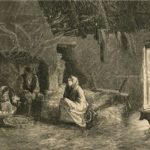 A search through the catalogues in PRONI for records relating to the estate of the Worshipful Company of Fishmongers in the Limavady area found the following extract from the Journal of Tour to Ireland 17th March-23rd May 1820 written by John Towgood. Towgood may have been an agent of the Fishmongers, his tour included many meetings with Barré Beresford of Walworth Manor, the primary tenant of the Fishmonger’s estate, where they discussed rentals and the condition of tenants. On his tour Towgood made notes about the living conditions of some of the poorest inhabitants of the area:
A search through the catalogues in PRONI for records relating to the estate of the Worshipful Company of Fishmongers in the Limavady area found the following extract from the Journal of Tour to Ireland 17th March-23rd May 1820 written by John Towgood. Towgood may have been an agent of the Fishmongers, his tour included many meetings with Barré Beresford of Walworth Manor, the primary tenant of the Fishmonger’s estate, where they discussed rentals and the condition of tenants. On his tour Towgood made notes about the living conditions of some of the poorest inhabitants of the area: “Saturday 1st April. We proceeded after breakfast on a further view of the estate….in the course of the day we entered …many very wretched hovels, called cabins….On entering the cabin, by a door through which smoke is perhaps issuing at the time, you observe a bog peat fire, around which is a group of boys and girls as ragged as possible and all without shoes or stockings, sometimes a large pig crosses the cabin without ceremony, or a small one is lying by the fire with its nose close to the toes of the children; perhaps an old man is seen or woman, the grandfather or grandmother of the family with a baby in her lap, two of three stout girls spinning flax, the spinning wheels making a whirring noise, like the humming of bees; a dog lying at his length in the chimney corner perhaps a goose hatching eggs under the dresser and all this in a small cabin full of smoke, an earth floor, a heap of potatoes in one corner and a heap of peat turf in another, sometimes a cow and sometimes a horse occupy the corner. In an inner room there are two or more wretched beds and yet the poor inhabitants of these miserable hovels appear in general to be contented.”
Towgood’s account is an insightful look at how the poorest of the population were living in the Limavady area in 1820 and these living conditions were likely to be replicated across the country.
